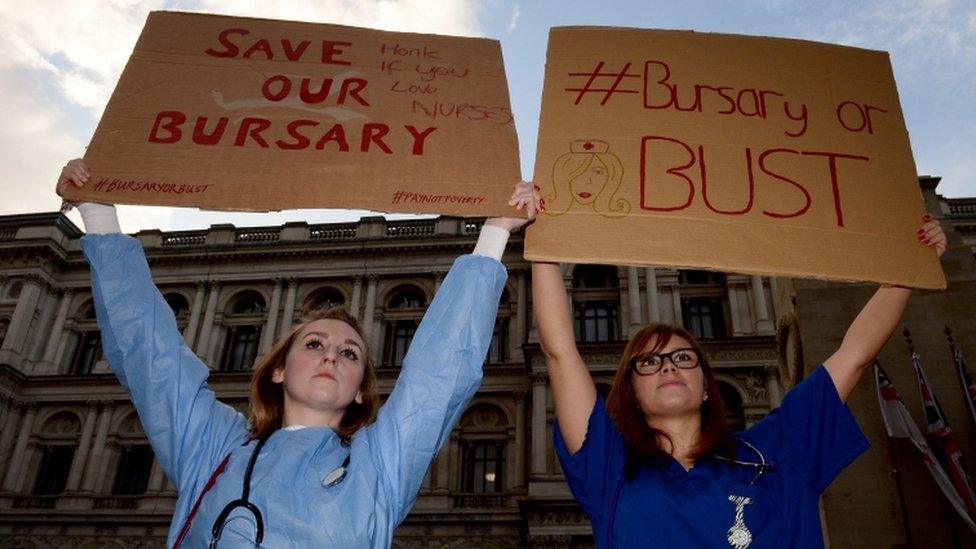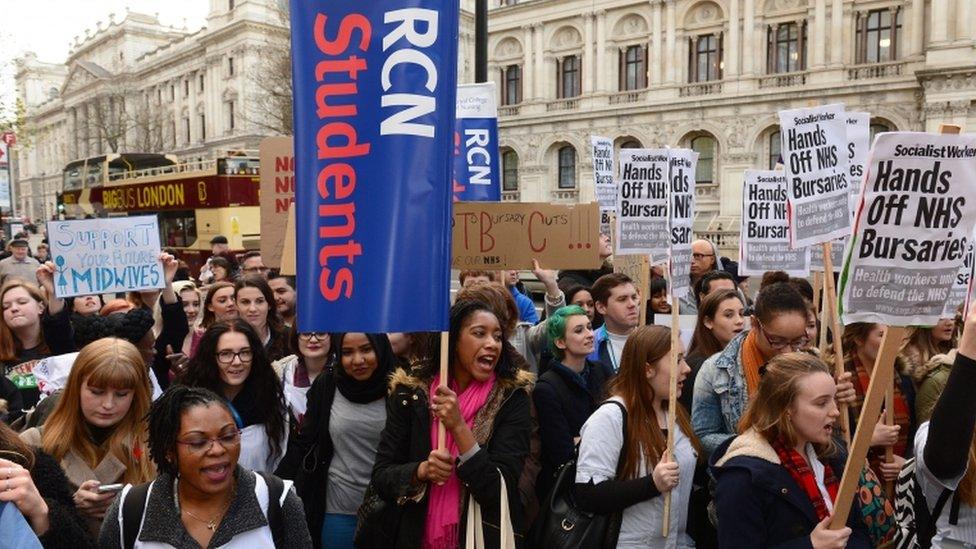Is another fight with health staff brewing?
- Published
- comments

Student nurses at a protest in central London
Health workers have been back on the streets protesting - but this time it isn't the junior doctors.
On Wednesday afternoon - as MPs debated air strikes in Syria - hundreds of student nurses (not to mention midwives, podiatrists, occupational therapists and radiographers) marched around Westminster.
Their gripe? The decision announced in last week's spending review to scrap bursaries, external and introduce tuition fees.
The government's rationale is that at a time when the NHS is under enormous financial pressure, providing financial assistance when other students pay their way is simply unaffordable.
The system also means the number of places has to be capped. As a result demand outstrips supply of places by two to one.
Ministers believe by scrapping the bursaries they can save £800m a year as well as increasing the number of nurses and other professionals because there will be no need for a cap.
But - as the pictures above and below show - the move is being met with strong resistance. Royal College of Nursing general secretary Janet Davies has described it as a "crushing blow".
Her argument - and it is one that is being made by others too - is that student nurses are different.
They spend half their time in clinical practice caring for patients and unlike other students do not get long breaks at Easter, Christmas and during the summer (denying them the opportunity to earn money pulling pints or waiting on tables).
Bursaries are, she says, a "lifeline" not a "luxury". She believes the move could even have the opposite effect the government wants, and actually discourage people from applying.

At a time when the NHS is already short of nurses - vacancies are proving hard to fill forcing the health service to rely on expensive agency staff or recruiting staf from abroad - that would be a disaster.
With the cuts due to be implemented in 2017, this is a dispute we could be hearing much more about.
And, of course, it comes just days after a temporary truce has been called in the junior doctor dispute, external with both sides embarking on a fresh round of talks to try to find a solution.
If they unravel, and this dispute escalates, the government could find itself in a fight with two sets of staff. And that is before we even consider the possibility of the talks that are on-going over the consultants' contract collapsing.
A quick scan of social media shows there is already a great deal of anger being directed towards Health Secretary Jeremy Hunt.
But others are getting drawn in too. The well-respected and admired NHS medical director, Sir Bruce Keogh, recently found himself the subject of much ire when he raised concerns about the idea of junior doctors going on strike (although admittedly he was pretty inflammatory in questioning whether they would be available if there was a terrorist strike).
So why is the government so intent on picking a fight with staff? The truth is, it isn't. Ministers would probably happily leave many of these issues alone if they could.
But one of the problems they face is that to change the NHS or to save it money staff are the obvious target.
Half the NHS budget is spent on labour costs and unlike in other areas of public spending (I'm thinking libraries and bin collections) it's simply not possible to start closing or restricting services en masse.
Battles between government and health staff could become a common theme of this Parliament.
- Published25 November 2015

- Published26 November 2015
- Published22 October 2015
